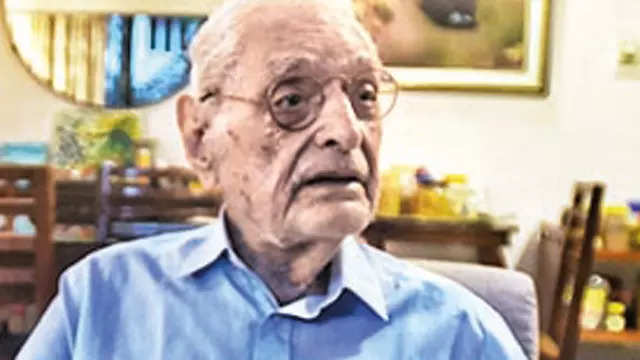Before his death, Cooper was the only living Indian to have played in the Pentangulars, the pre-Independence league that hosted teams formed on community lines, and the Ranji Trophy. He played for the Parsees (1941-42 to 1944-45), Bombay (1943-44 to 1944-45) and Middlesex (1949-1951).
Cooper featured in 22 First-Class matches-with his crowning glory coming in the 1944-45 Ranji Trophy final, in which he scored a century for Bombay (as Mumbai was called back then) against Holkar. From 1940-55, he played with and against the best cricketers of that time.
Cooper scored 52 & 104 in the 1944-45 Ranji Trophy final between Bombay and Holkar at the Brabourne Stadium. That First-Class season, in which he scored 551 runs @ 91.83 with two tons and five fifties, turned out to be Cooper’s last in India.
At the age of just 23, he went to the London School of Economics. In 1947, while studying at the LSE, he played for Middlesex County with the likes of Dennis Compton, JJ Warr and Bill Edrich. Though he didn’t taste much success with Middlesex, he scored plenty of runs in club cricket in the UK.
He was an alumnus of Elphinston school and St Xavier’s high school. After completing his course in the LSE, he was invited by the Lincoln’s Bar for Bar At Law. He returned to India in 1954 but couldn’t play competitive cricket as his employers refused leave to play the sport. However, he represented the Cricket Club of India in local tournaments and was a prolific scorer. He was a trustee of the Bombay Port Trust for several years. Till he was in his 90s, he was a practising maritime lawyer.
“Rusi had a group of 12 yesteryears cricketers, and they used to meet regularly on Thursday afternoon at the Cricket Club of India. These meetings stopped after the passing away of TK Contractor. The others were Vijay Merchant, Anandji Dossa, Nari Contractor, Bapu Nadkarni, Farokkh Barucha, Rusi Modi, Madhav Apte, Aravind Apte, Vasant Raiji and Madan Raiji. I remember that on a couple of occasions, Sachin Tendulkar, then a schoolboy, joined them for a dessert. I would be standing there hearing all the old cricket stories and history of the game from them,” said Marcus Couto, a BCCI umpire.

